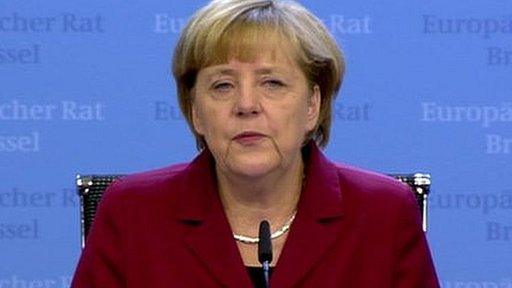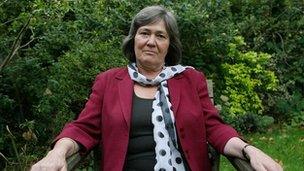How do world leaders cope with being bugged?
- Published

The most common reaction to news that German Chancellor Angela Merkel's phone was bugged by the US National Security Agency appears to be world-weary resignation.
Followed by a sly suggestion that someone of her experience and stature should have known better.
Kurt Volker, former US ambassador to Nato 2008-2009, told the BBC Radio 4 Today programme "every country spies" and he could not believe that the revelations were a surprise to anyone.
Lord West, a security minister under Gordon Brown, said he had "always worked on the assumption" that people were listening to his phone calls.
"I know they jolly well were," he told Today.
"I don't think it's surprising that people try and listen. If you are a head of state there are lots of people, not just other states, who are listening.
"There are companies, all sorts of people, who want to hear what you are saying and I think you have to be extremely careful."
'Shocked'
A former senior British diplomat, who did not want to be named, told the BBC News website he always worked on the assumption that his phone calls were being listened to.
This could sometimes be turned to the British delegation's advantage, he explained, by reinforcing the message that they were trying to get across in negotiations in supposedly private phone conversations, knowing full well that they would be intercepted.
But at the same time, it was worth remembering when reading reports of what the representatives of other nations were saying that they were probably up to the same game, he added.
Former Home Secretary David Blunkett recently revealed that Nicolas Sarkozy, the then French interior minister, tried to save time in negotiations over the closure of the Sangatte transit camp by saying he already knew the British position because the French secret service had intercepted unencrypted Home Office emails.
But not everyone is quite so sanguine.
Clare Short, who made headlines and provoked fury in Downing Street in 2004 when she revealed that the British secret service had bugged the office and telephone of then UN Secretary General Kofi Annan, says she was genuinely "shocked" by the Merkel revelations.
The former international development secretary also rejects the argument that Mrs Merkel's anger is for the benefit of the German public, many of whom are still haunted by the memory of the Stasi.
"I am sure she was very angry and upset. These were her friends and now [she finds] they don't trust her," says Ms Short.
Blair myth
Ms Short said she was regularly given intelligence reports about what Mr Annan was saying in the supposed privacy of his office but she became increasingly uncomfortable about this in the run-up to the Iraq war.

Clare Short says she told MI6 chiefs she did not need their services in Africa
She recalls the surreal and disturbing experience of chatting to Kofi Annan on her mobile phone and realising that someone would probably be listening in and transcribing every word.
She says she can not recall any examples of being handed intelligence reports about what friendly powers were saying to each other on the phone during her time in office, from 1997 to 2003.
But she says she was approached by "successive Cs" - the code name for the head of MI6 - offering to spy on the leaders of friendly nations in Africa.
"I told them, 'No of course not. We don't want to spy on the people we are working with,'" she tells the BBC News website.
She also explodes one popular myth about notorious technophobe Tony Blair - that he did not carry a mobile phone during his years in power.
"I don't really believe that," she says, adding that it might be part of Downing Street myth-making: "It makes him more emperor-like."
All heads of state, in the Western world at least, will have access to encrypted mobile phones and other secure lines.
White House 'bubble'
The problem, for security staff, is convincing world leaders to take the espionage threat seriously.
Shortly after taking office in 2008, Barack Obama managed to convince the secret service to let him keep his own Blackberry, despite fears it would broadcast his location and make him vulnerable to hacking.
Mr Obama is said to be frustrated about having to live in the White House "bubble", cut off from the outside world and unable to communicate with normal people.
The President's Blackberry is often seen on his belt and he is sometimes pictured scrolling through his messages as he travels in his limousine.
In France, senior officials have access to a secure intranet and phone network - but the country's leaders are reported to be reluctant to use the slow and restrictive system, which can take up to 30 seconds to place a call.
President Francois Hollande is said to have followed predecessor Nicolas Sarkozy by holding on to his personal smartphone.
Mobile phones are banned in No 10 - you have to hand them in at the door - over fears foreign powers are listening in.
All calls in and out are routed through a secure switchboard staffed by officials - a system which continues when the prime minister is travelling.
Downing Street is remaining tight-lipped about the latest bugging revelations.
Asked earlier if the prime minister was still using his mobile phone, Mr Cameron's official spokesman said: "I haven't seen him use a different one".